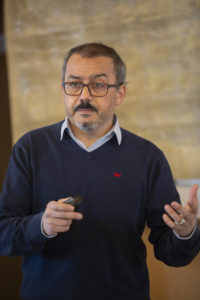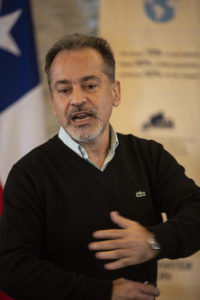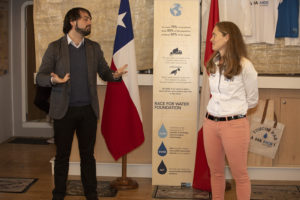Thirty-four Chilean environment specialists responded to the Race for Water Foundation’s call to participate in the “Plastic Waste to Energy” workshop organised aboard the vessel in Valparaiso on 12 June.
Exchange to make progress
“If all the people present at this event are experts in their field, then at some point they have all needed to exchange and compare ideas. That’s the aim of these meetings,” explains Camille Rollin, specialist of the Plastic Waste to Energy projects for the Race for Water Foundation. At each of the vessel’s stopover destinations, the young woman has joined the crew to organise and host these encounters. “It’s exciting and very enriching for our cause, the preservation of the oceans, to know about and understand the geographical, historical and environmental constraints of every country we visit. We’re all aware of the need to preserve our environments. In terms of the way to achieve that and the means put in place, everyone has their own idea. Understanding all that, enables us to offer concrete solutions like the technology developed with our partner ETIA, which promises to transform plastic waste into energy, giving value to plastic and providing a new source of remuneration for street collectors.”
Various interventions
During this workshop, 34 protagonists involved in environmental matters gathered together to tackle the different topics, which were as varied as their profiles. The local context was discussed initially.

Mr Pablo Fernandez, in charge of the issue of waste for the Circular Economy advisory board of the Ministry of the Environment opened the discussion by presenting the new law stretching out the responsibility of producers and the encouragement to recycle. Its aim is to reduce the production of waste and push for reuse, recycling and others types of recovery.
Though Chile is among the countries, which produce the least amount of waste with 1.1kg of waste per person/day, it ranks poorly in the processing of the latter as its main means of management is the often non-controlled dumping in landfill sites.

Mr Aldo ARIAS, Director of the Swiss company Fromm in Chile continued the discussion by pointing out that the system for collecting waste in Chile isn’t efficient. Indeed, whilst his business involves converting plastic bottles into strapping for products on pallets, he cannot find enough raw materials in Chile. That’s not to say that this raw material, namely plastic bottles, is lacking. “No, it’s just that this type of waste doesn’t reach us as it’s not collected. Just 14% of the bottles come from Chile! For the rest, we’re compelled to import them from Ecuador, Peru, Germany, Colombia, Bolivia and Argentina. It’s nonsense!” And it’s worth noting that this is not in line with Fromm’s wishes, but the local authorities have no plans to come up with another solution in the immediate future.

Jorge SCHARP, the mayor of Valparaiso discussed the unique topography of the city of Valparaiso, which is built on hills, and the poor state of repair of its fleet of bin lorries and the lack of means available to manage the situation properly, which is just one of the subjects to be dealt with…
In Chile, environmental awareness is slowly filtering into the minds of some inhabitants, but there is still a huge amount of work to be done since on a cultural level Chileans are still used to throwing things away with no concern for waste management.
“Education is key. People need to know how to sort, recycle and understand the impact of their actions. Ideally, there would even be a law in the educational programme that introduces the concept of such training,” says Camille Rollin before rounding off the morning reminding those in attendance that “There’s a state of emergency” and that to face up to the challenges of the 21st century, there must be efforts made on every side. “Naturally, we’re thinking first about regulations, but if we want to combat plastic pollution of the oceans effectively, the reduction of the waste generated by every one of us is the best possible solution. It is essential that manufacturers, and packaging producers in particular, assume more responsibility too. It is imperative that they consider the end of their products’ life when they’re designing them. Finally, the Plastic Waste to Energy solution put forward by the Foundation enables a form of waste management, which is adapted to the different local contexts. This small and medium capacity technical solution favours waste management and decentralised energy production, which are recognised as being efficient.”